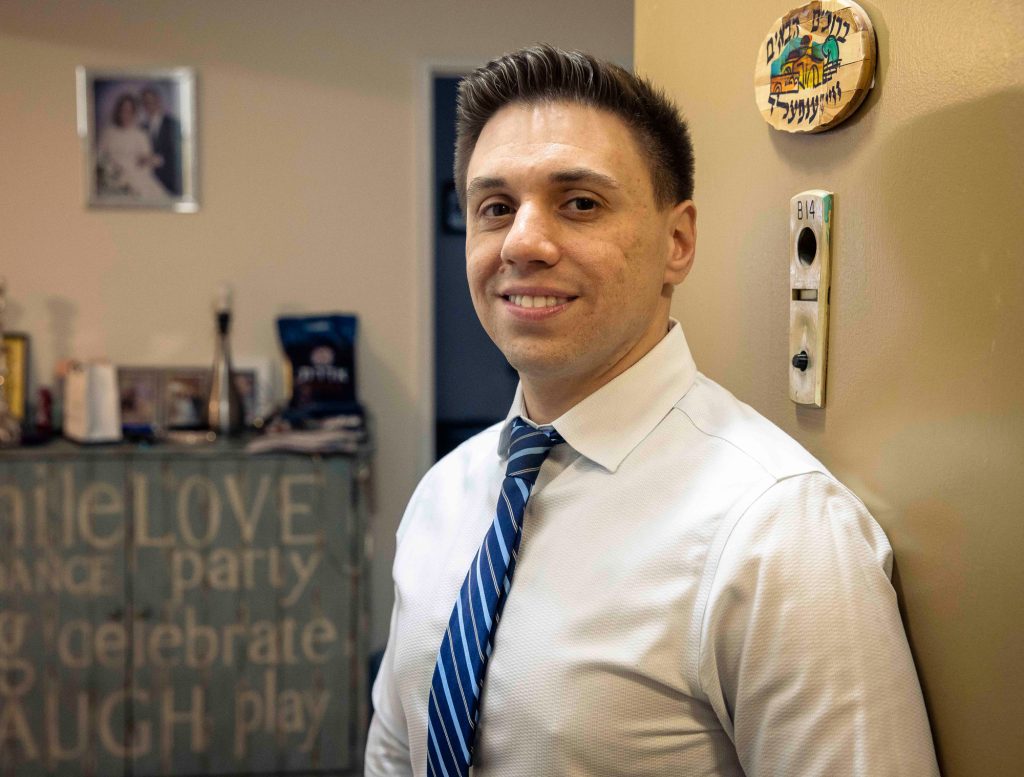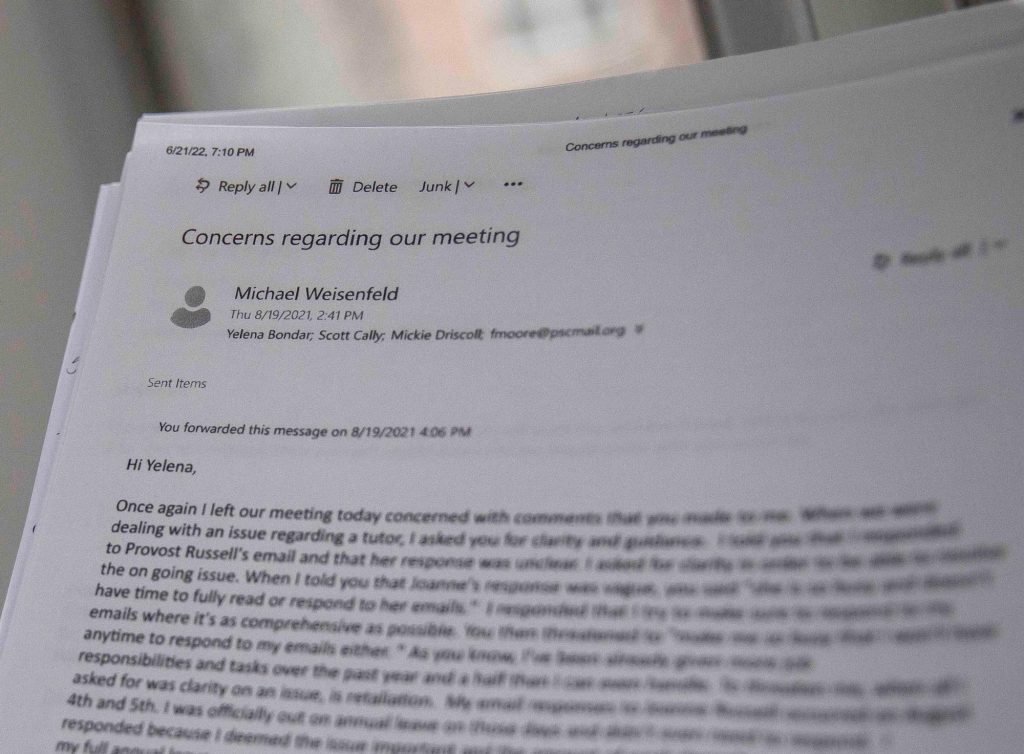
Michael Weisenfeld, a HEO at Kingsborough Community College, prevailed in an arbitration case filed over excessive work hours required to direct three tutoring centers that were merged into one. (Credit: Dave Sanders)
Kingsborough Community College (KCC) administration violated Higher Education Officer (HEO) Michael Weisenfeld’s contractual protections against “excessive workloads” and must justly compensate him as result, an arbitrator has ruled.
Weisenfeld was hired in 2015 to be the director of KCC’s Tutorial and Academic and Research Center, one of three KCC tutoring centers at the time. He was responsible for supervising a small staff of two and managing the office’s $150,000 annual budget. In 2019, KCC administration announced that its three tutoring centers would merge into one program and appointed Weisenfeld interim director of the college’s new Learning Center. Weisenfeld told his dean that he wasn’t sure he had the support to oversee such a large office within the 35-hour work week, as mandated by the PSC-CUNY contract. He was eager, though, to continue providing quality service to students.
LACK OF RESOURCES
Weisenfeld warned his supervisors that KCC hadn’t given him the resources necessary to successfully expand the office under such a merger. “You don’t have offices. You don’t have space,” Weisenfeld recalled telling the administration in an interview with Clarion. They just said, ‘Combine it, and get to work.’”
In March 2020, following the merger, his fears became a reality. Not only was Weisenfeld overseeing eight full-time staffers rather than two (as he had been doing) and more than 60 tutors, he was also responsible for the office’s sudden transition to remote work as a result of the COVID pandemic. “I wasn’t sleeping. I was stressed out,” Weisenfeld said.
His work had tripled. “The administration gave me a completely new job description with more duties and responsibilities,” he said. “In addition to all this work, they also gave me the responsibilities of overseeing the ASAP and College Discovery tutoring duties.”
And he never saw a dime more in pay despite the increased workload. In fact, Weisenfeld presented documents showing that he is among the lowest paid in his title at the college. “Out of 47 HEOs at my college, I oversee the biggest department, yet I am paid 43rd [lowest] out of 47,” he said.
Nevertheless, he continued to get things done. CUNY documents show that Weisenfeld was doing stellar work despite the trying conditions. His evaluation memo, surveying his work for all of 2020, stated that he had “an excellent operational sensibility” and continued “to respond extremely well to operational and logistical challenges.” It even went so far to say that he had “effectively managed the integration of the three tutoring areas.”
But Weisenfeld knew he wasn’t being treated justly in terms of his pay and hours. He made various complaints, and one administrator, as Weisenfeld recalled, responded that he “should just quit” if the workload was too cumbersome. Weisenfeld said the insult stung, especially because he was getting compliments from his superiors on the hard work he was doing.
During this time Weisenfeld submitted time sheets, reflecting that he was working more than 35 hours a week, but he was told by administrators that “he was not eligible for overtime and to not put extra hours on his time sheets,” the arbitrator acknowledged. Weisenfeld told Clarion that his superiors had even verbally promised that he could be brought up the salary ladder by several steps in exchange for his increase in duties, but that his pay raise never materialized.
PSC GRIEVANCE
Weisenfeld called the union office about his problems, and he was encouraged by Faye Moore, PSC’s director of contract enforcement who was then a contract enforcement coordinator, to file a grievance regarding the violations of excessive workload. Despite having job protection under Article 13.3b of the contract, he didn’t initially feel comfortable going into a contractual dispute. But at a certain point, Weisenfeld felt he had no other choice. “I had to stick up for myself. I had to stand up for my rights,” he said. “I was not going to let them take advantage of me.”
He eventually filed a grievance that led to an arbitration hearing, during which the union argued that he had been mandated to work excessive hours beyond the limits of the contract and that the Kingsborough administration knew the merger would result in an excessive workload for the new Learning Center’s director. Weisenfeld’s evidence was overwhelming. “I have 44 pages of documents going back and forth,” he said. “They had nothing to fight me on, and they should have just paid me what I deserved.”
GRIEVANT PREVAILS

An email, just one of the many detailed records Weisenfeld provided to successfully support his contract violation grievance. (Credit: Dave Sanders)
After looking at the record, an arbitrator sided with Weisenfeld.
“Looking at the Grievant’s pre-merger job responsibilities and number of hours worked as the norm, in no uncertain terms the extra work and hours the Grievant generated exceeded what was ‘usual or normal,’” arbitrator James Darby said in his January 6 decision. “Therefore, I conclude the Grievant was required to work ‘an excessive number of hours.’ Rather than contend that the Grievant never actually worked the hours in question, CUNY simply attempts to discredit the Grievant’s calculations based on a lack of specificity and his failure to submit the extra work time for approval prior to performing it. These contentions miss the mark.”
Darby added, “The record clearly shows the College was on notice the Grievant was working excessive hours in order to complete the job requirements. At no time did the College instruct him that he needed to get this extra time approved in advance or that it needed to be substantiated or documented. To the contrary, the record reveals that the College understood throughout the period of March through November 2020 that the Grievant was working many extra hours but merely assured him ‘things would get better’ and that he would eventually be compensated for his efforts. From the College’s perspective, as director of the Learning Center, he was expected to get the job done no matter how many hours it took. For this reason, it is not surprising the record shows that HEOs like the Grievant were told to just put 35 hours on their time sheets.”
CONTRACT VIOLATION
Darby ruled that the college had violated Weisenfeld’s contractual rights and thus, “CUNY shall provide the Grievant with compensatory time for each hour he worked in excess of 35 hours per week between March 2020 and November 2020,” adding that if “the College’s operational needs do not permit the Grievant to use all of this additional compensatory time by two years from the date of this Award, the College shall pay him any amount of compensatory time remaining at straight time.”
PSC First Vice President Andrea Vásquez, who is also a HEO who once led the PSC HEO chapter, told Clarion, “This is one example of how professional staff went above and beyond their job descriptions, [with increased] hours and workload during the Covid pandemic. Michael Weisenfeld exemplifies the commitment of CUNY workers to keeping the university running and to meeting the needs of our students. In this victory, CUNY must now grant him retroactive comp time or pay him for the hours he worked.”
A WORTHY FIGHT
Moore added, “If members feel that they are being required to work more than 35 hours a week without being granted comp time, they should immediately document that work and contact the Contract Enforcement Department at the PSC.”
On the one hand, Weisenfeld said that the decision could put the KCC administration on notice. For the union, the case sets an arbitral precedent that the union could use to protect members and enforce the contract if similar cases occur in the future.
But on the other hand, Weisenfeld said, the facts of the case demonstrate the disregard some CUNY bosses have for the contract. “With my administration this will tell them that they can’t just do what they want,” he said.
Weisenfeld reiterated that he was resistant, at first, to file a grievance. He believed that the administration should have just done the right thing and brought him up a few salary steps without any kind of formal fight. But looking back, he said, working with the union was the only way he could have protected his contractual rights.
“I could have let it go and let them take advantage of me,” he said. “I have no regrets. I had to do the right thing.”
Published: March 8, 2023 | Last Modified: March 9, 2023

